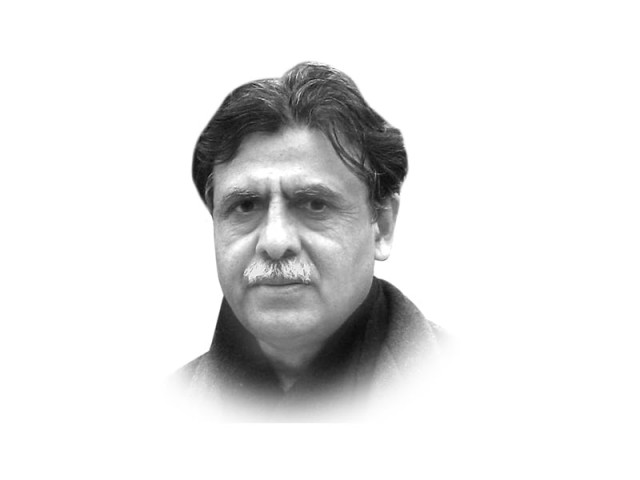Understanding the Yemen conflict
Despite the much-touted Iranian factor, the conflict in Yemen is primarily internally driven

The writer is an author, a public policy analyst and a former federal secretary. He teaches at the Lahore University of Management Sciences
We are still reeling from the combined impact of these three events and one can find certain similarities with modern-day events and those that took place in 1979. There is, however, one key difference. Way back in 1979, it was General Ziaul Haq and his hand-picked coterie of men taking the key decisions, while today we have a parliament with a persuasive influence on the state's responses to a fluid and highly uncertain situation in the region.
While the Soviet occupation in Afghanistan spawned the unremitting phenomenon of jihad, drawing Arab and indigenous warriors to the war of attrition, the Iranian Revolution set the stage for proxy wars along sectarian fault lines. A stage came when there was a complex mix of the two phenomena. The Afghan jihad was geared through generous patronage from the US and Saudi Arabia, which provided cash and weapons while Pakistan provided the staging ground. Over a period of time, the ideological content that was provided resulted in the throwing up of deadly outfits like al Qaeda, as well as other groups, both Afghan and Arab, and subsequently, the Pakistani Taliban.
The Iranian Revolution, on the other hand, set the pace for movements like Hezbollah in the region. Over a period of time, the other side of the divide threw up forces like the Islamic State, which has now turned Syria and Iraq into permanent war zones. There is, however, a difference between the two discourses. The outfits that were spawned as a result of the Afghan jihad turned their guns against their own benefactors, while the ones resulting from the Iranian Revolution remained closely aligned with Iran. This is mainly because the latter movements are geared more towards political empowerment than ideological pandering with the flexibility to co-opt other partners to meet common objectives whenever the situation so demands.
The events in Yemen are being seen through the sectarian prism while the situation on the ground suggests that the Houthis, who have captured vast swathes of territory and strategic points, have not overloaded their movement with sectarian identity. They have entered into compacts with many diverse groups, including the former president Abdullah Saleh in their fight against the beleaguered Saudi-backed central authority. Despite the much-touted Iranian factor, the conflict in Yemen is primarily internally driven. We need to understand the context before committing ourselves in any manner.
In the southern part of Yemen, there are simmering secessionist movements, like that of Al-Hirak al Janubi which is striving for the split of the country along the old lines i.e., between South and North Yemen as had been the case in the past. In 1990, the two countries were merged together. This movement has an eye on the coastline and the strategic strait in the Red Sea navigating the oil trade. The Houthis, on the other hand, have a strong presence in the north and have also moved southwards with the central government’s resistance crumbling. In their struggle, they do not press any sectarian strand to the exclusion of their allies against the Saudi-backed central government. They have allies in the security forces and have publicly taken anti-US and anti-Israel stances. Further meltdown and increasing air attacks by the Saudi-led forces may well trigger the influx of displaced persons to Saudi Arabia's eastern province which adjoins Yemen. This is a matter of concern for the Saudis. The GCC states have backed the air strikes against the Houthis but these may not deliver results unless they are backed by on-ground operations. The Gulf armies are hardly trained in this regard as they are mainly meant to quell small-time local rebellions and to maintain internal security. The Saudi request to Pakistan for assistance has to be understood in this backdrop.
Pakistan already has enough on its plate in terms of the ongoing war on terror. Sectarian fault lines continue to burst at the seams from Gilgit to Hazara Town in Quetta. While heeding Saudi concerns, we should be helping the parties to come to some arrangement in handling the crisis. Fingers are being pointed towards Iran for allegedly supporting the Houthis. Pakistan needs to open instant channels with Iran and bring home the seriousness of the situation and elicit its response to the crisis.
Pakistan is eminently placed for this role more than any other Muslim country. The prime minister has met with the Turkish leadership on the issue, but it is more important to engage with Iran to diffuse the situation. Saudi Arabia needs to take stock of its domestic situation as well, more so in its eastern province where there is a growing feeling of having been left out of the system.
The late King Abdullah initiated a commendable process of reforms, improving consultative mechanisms and giving more rights to women. After his death, the process should not falter and the push for a more inclusive society should continue.
Published in The Express Tribune, April 7th, 2015.
Like Opinion & Editorial on Facebook, follow @ETOpEd on Twitter to receive all updates on all our daily pieces.














COMMENTS
Comments are moderated and generally will be posted if they are on-topic and not abusive.
For more information, please see our Comments FAQ